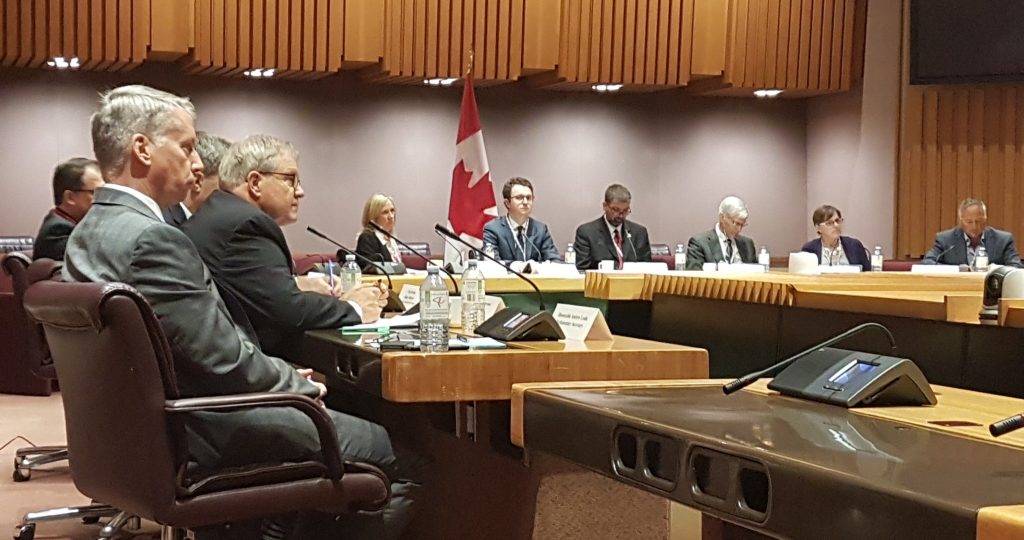
Libs will defend supply management in NAFTA talks: MacAulay
By The Canadian Press
Features Business & Policy Trade Agriculture Minister Lawrence MacAulay and Parliamentary Secretary to the Minister of Foreign Affairs, Andrew Leslie, met with agriculture stakeholders during a roundtable on NAFTA. Agriculture and Agri-Food Canada
Agriculture Minister Lawrence MacAulay and Parliamentary Secretary to the Minister of Foreign Affairs, Andrew Leslie, met with agriculture stakeholders during a roundtable on NAFTA. Agriculture and Agri-Food CanadaSeptember 25, 2017, Ottawa – Canada is ready to modernize the North American Free Trade Agreement, but supply management will be protected, Agriculture Minister Lawrence MacAulay said Monday.
”We’re quite ready to defend a system that works so well for this country, so well for the dairy farms, so well for consumers and (is) a model for the world, I might add,” MacAulay said as he left a meeting with Canadian farmers.
MacAulay met representatives from the agricultural industry – including wine, dairy, pork and beef – during the third round of talks with the U.S. and Mexico to replace the 23-year-old trade deal.
The minister said his defence of the system that protects Canadian dairy, eggs and poultry does not mean there is nothing about the trade deal that needs changing.
”The U.S. realizes we are their friends, but there’s things to iron out and hopefully it will iron out in a very positive way and even make the deal better.”
Some of the thornier issues expected to come up in NAFTA talks involve the Canadian agricultural industry, especially since the U.S. wants greater access for its dairy products.
On Sunday, Canada’s chief negotiator said he did not expect to see any details from the U.S. on its desire to end the supply management system for dairy and poultry this time around.
Steve Verheul also said he did not expect the U.S., which triggered the renegotiation of the continental trade pact, to table detailed proposals during this round of talks on two other hot topics – investor state dispute settlement process and American content requirements for vehicles.
Prime Minister Justin Trudeau said Canada respects the pace of the negotiations.
”But Canada is always there, has done its homework, we have concrete proposals on the table and we’re very pleased to have a chance to discuss them with our counterparts from the other countries,” he said at an event in Toronto.
The dairy sector was excluded from the original NAFTA deal in 1994, but the supply management system, which limits the amount of dairy that can be imported into Canada without high tariffs, has long been a point of contention.
A more recent dairy-related issue that also came up was a deal reached by the 12,000 dairy producers in Canada to sell milk proteins to domestic processors at a discount in order to further protect the industry from imports of cheap U.S. milk ingredients.
Jacques Lefebvre, president and CEO of the Dairy Processors Association of Canada, said his organization has told the Liberal government they do not think the sector should be part of the renegotiation of NAFTA at all.
”If the government can make a good case as to why it should be, then we need to ensure that any concessions to the sector, to the dairy market in Canada, is met with an equal net benefit to the sector,” said Lefebvre, who was at the meeting with MacAulay.
As the meeting opened, the Liberal government said it is committed to boosting food exports to $75 billion by 2025.
Conservative MP Erin O’Toole acknowledged Foreign Affairs Minister Chrystia Freeland mentioned protecting supply management in her speech outlining her broad NAFTA objectives last month, but he would like to know more.
”We’ve since not seen the government … set the table ahead of negotiations to show how that industry and the thousands of families that rely on it must be safeguarded in negotiations,” O’Toole said.
O’Toole said he would also like to see the Liberal government be clear in its goals for other areas too – especially when it comes to protecting and creating jobs in the auto, softwood lumber and resource sectors.
Print this page